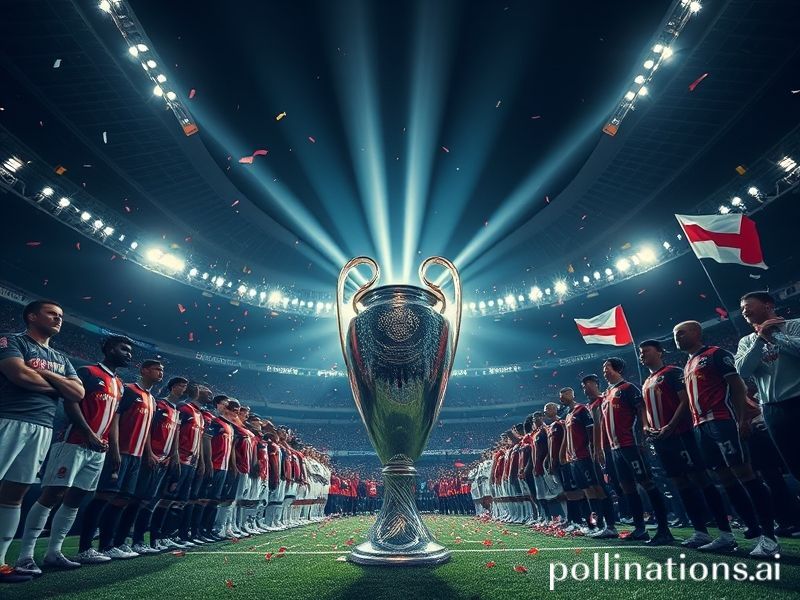The Europa League: Thursday Night Football, Geopolitics, and the Art of Finishing Seventh
Thursday in Baku or Bratislava used to mean nothing more than an extra shot of rakı or borovička in a dimly lit bar. These days it means the Europa League has rolled into town, trailing camera crews, riot police, and a caravan of men in Stone Island who look like they moonlight as debt collectors. For 90 minutes plus whatever injury-time charade the referee decides to gift us, the planet’s most gloriously second-tier football competition convinces us that finishing seventh in La Liga is a triumph worthy of continental conquest.
The competition began life in 1971 as the UEFA Cup, back when Europe’s borders were still drawn by men with mustaches and questionable cartography. Rebranded twice—first to convince us it’s not just the Champions League’s kid brother, then again because focus groups insisted “Europa” sounded more mythic than “Thursday night in Azerbaijan”—it now stretches from Reykjavík to Yerevan like a budget airline route map that’s been left in the rain. In theory it’s about sport; in practice it’s a traveling trade fair for betting sponsors, airlines you’ve never heard of, and cryptocurrency exchanges that vanish before the group stage ends.
Globally, the tournament functions as a geopolitical mood ring. When Russian clubs were abruptly exiled in 2022, the message was clear: tanks trump transfers. Meanwhile, Israeli and Palestinian clubs keep being shuffled around neutral venues the way teenagers hide liquor bottles when the parents come home early. One year Moldovan sheriffs slay Real Madrid; the next they can’t get past the qualifying round because their entire back line defected to wealthier clubs in Turkey. The Europa League is where a Ukrainian side can win on the night while air-raid sirens sing harmony in the distance—proof that even in wartime, someone still has to track the away-goals rule.
For viewers outside Europe, the competition is a crash course in post-industrial city planning. You haven’t truly lived until you’ve watched a grainy feed of a match in northern Bulgaria while the commentator explains that the stadium was built on a decommissioned steelworks and the floodlights are powered by leftover Soviet spite. In Jakarta cafés, bleary-eyed fans debate whether the coefficient points from a Serbian club’s victory will help Scotland sneak an extra Champions League berth. It’s globalization’s version of a chain email: nobody quite knows how it started, yet here we are, emotionally invested in the coefficient fate of Dundee United.
The economic subplot is equally bleak and hilarious. UEFA distributes prize money with the generosity of a billionaire tipping 3%. A Champions League group-stage win nets you €2.8 million; in the Europa League you get a pat on the back and a voucher for airport duty-free. Clubs therefore treat progression like a payday-loan scheme: borrow heavily against future TV rights, pray your striker’s hamstring doesn’t snap, and hope the knockouts land you a glamour tie with Manchester United so the accountants can finally afford to fix the dressing-room boiler.
Human nature reveals itself in the stands. English fans discover that “historic city centers” in Eastern Europe are mostly kebab shops and statues of partisans who would have found the concept of Spurs supporters hilarious. Turkish supporters greet every referee decision as if it were a personal slight from the Treaty of Sèvres. Italians travel in such small numbers that the ultras are outnumbered by local teenagers selling counterfeit scarves, yet still manage to choreograph a tifo referencing Dante’s Inferno. Somewhere in the neutral zone, a lone Canadian tourist Googles “What is aggregate scoring” and wonders why everyone is singing about 1980s war crimes.
When the final whistle blows in Dublin or Seville, the victors lift a trophy that looks suspiciously like an IKEA lampshade. Fireworks go off, confetti clogs the drains, and UEFA’s president pronounces the tournament “a celebration of European unity,” which is code for “our broadcast revenue exceeded expectations.” The winning club earns a Champions League place it will almost certainly squander, the losing club fires its coach by text message, and the rest of us return to our respective time zones, slightly poorer and only marginally wiser.
And yet, next Thursday we’ll do it all again—because hope, like a budget airline, is terrible and irresistible in equal measure.







